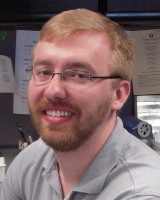
- Campuses :
- Twin Cities
- Crookston
- Duluth
- Morris
- Rochester
- Other Locations

center for writing
writing.umn.edu
writing.umn.edu
Center for Writing alumni—Adam Rusinak
 11 Questions for Center for Writing Alums
11 Questions for Center for Writing Alums
- Your name: Adam Rusinak
- Your email: adamrusinak@gmail.com
- When did you work with us? 2005 to 2010
- What was your role? writing consultant, front desk/computer lab attendant
- What education and/or occupation(s) have you pursued since working with us? National Park Internships (including being a Jr. Ranger Ambassador...it's as awesome as it sounds), NCLB tutor for middle school students, editor for Minnesota's Future Doctors, Professional Writing Tutor at Anoka-Ramsey Community College, and currently Coordinator of the Academic Support Center at Anoka-Ramsey Community College.
Reflections on your center experience:
- Did your work with us influence your educational or occupational choices? If so, how? It ultimately made me realize that I want to be a professional tutor at the college level. While in my M.Ed program to become a K-12 teacher, I realized that that job was not for me. While thinking about what I wanted or even could do, I thought about how much I enjoyed being a writing tutor (since I was working at the C4W while in the program). Once I started seeing actual job postings for professional writing tutors or jobs in academic/learning/educational support centers, I knew that's what I wanted to pursue.
- What are the most significant abilities, values, or skills that you developed in your work with us? So many that's tough to narrow it down to a few. First and foremost, tutoring got me to think about my own writing process, which in turn helped me immensely in my classes. Equally important, I learned how to give concrete, specific advice about writing. I think sometimes it's too easy to get focused on the emotional component of writing or give advice in broad terms, and when working with someone who doesn't care about "their voice" or who just doesn't have a whole lot of writing experience, being able to give concrete suggestions or ask pointed questions is crucial to helping them out. I often found myself thinking about how to approach writing as a skill to develop or a paper as a task to accomplish, and this has helped me in all of my education jobs no matter what role I was playing or subject I was covering.
- In your personal and professional life today, how do you find yourself using what you learned from working with us? I touched on this in the previous question, but I'll also add that being exposed to such a wide range of papers and, more importantly, such a wide range of people has helped me out incredibly. I'd like to think I've always done a good job of treating people nicely and fairly in everyday life, but working at the C4W showed more about how that plays out in a professional setting: being able to tactfully and diplomatically talk about charged topics is important no matter where you work or who you talk to.
- Anything else you want to tell us and your fellow Center alums? Words almost cannot describe how much I enjoyed working at the C4W: it impacted me in so many positive ways (professionally and personally) that I can't even begin to describe how big of a role it played in my life.

